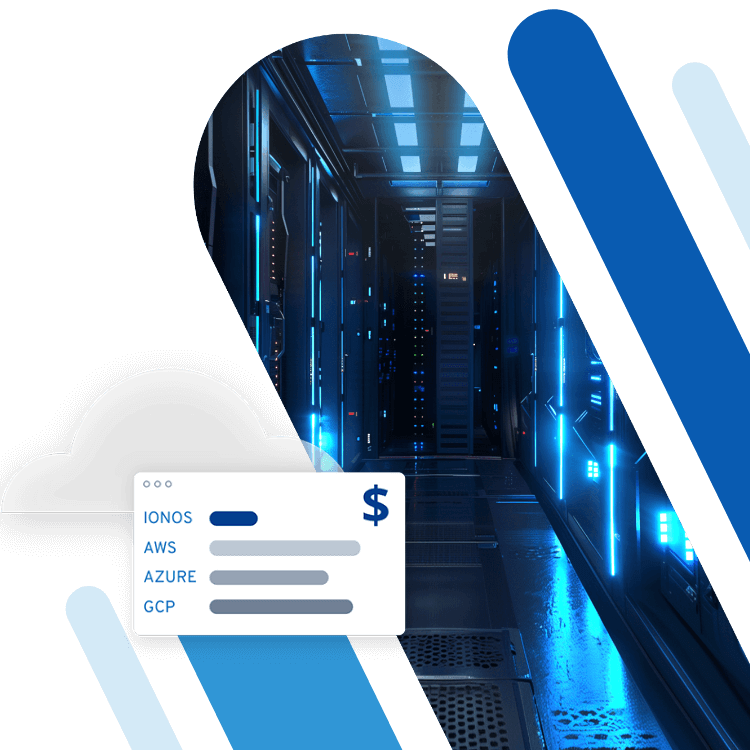Gaia-X
Most web services, software developments, internet standards, and digital infrastructure come from Silicon Valley or elsewhere in the US. Amazon and Google, for example, overwhelmingly drive global digital communication. Europe, on the other hand, has played a much smaller part. The European General Data Protection Regulation (GDPR) marked a controversial move in reimagining the internet’s future.
Now, the EU’s next step is the initiation of Gaia-X: a data infrastructure by and for Europe that places value on security, transparency, and data protection. At the helm of the project are the German and French governments that are collaborating closely with over 300 European organizations and companies on the project.
Register great TLDs for less than $1 for the first year.
Why wait? Grab your favorite domain name today!
- Matching email
- SSL certificate
- 24/7/365 support
Gaia-X: the status
Following a bumpy start, Gaia-X has now reached a point where the technical implementation is taking shape and coming to the fore. In the past few months, the parties involved worked out over 40 different use cases to derive its requirements and incorporate them into the development of Gaia-X structures. The following eight main categories were agreed on: industry 4.0/SMEs, finance, smart living, health, public sector, mobility, agriculture, and energy.
To establish a fixed structure for the project, companies and organizations from Germany and France have begun to set up an international non-profit association (French: association internationale sans but lucratif, or AISBL for short) according to Belgian law. Headquartered in Brussels, the association’s main area of responsibility is the development of technical solutions and the Gaia-X set of rules. The founding members signed the relevant documents in September 2020, but the relevant Belgian authorities have yet to review and approve them.
However, this is merely a formality and does not stand in the way of more concrete planning. A prototype implementation of the first Gaia-X services will be released as early as the start of 2021 and serves as a point of reference for further development processes. The Federal Ministry of Economics is funding the subsequent phase with over €200 million ($240 million) which also includes a competition for lighthouse projects (the deadline is set for Q2 2021). If the process goes as planned, responsible parties expect the first official Gaia-X-certified services by mid-2021. However, currently there is no information on the processes and framework data for an accreditation and certification of the services in question.
The publication of federated cloud services is schedule for the second half of 2021. This forms the basis for the trustful, transparent, and secure exchange of data.
The goals of Gaia-X
Gaia-X is often mentioned in connection with Gaia-Xthe term data infrastructure, which refers to a combination of services, technological circumstances, and know-how. So we’re not talking about a single concrete measure, even though cloud computing is a prominent part of the planning.
The main goal of Gaia-X is to strengthen the European digital economy to gain independence from the digital infrastructure of other global players like the US and China. During digitalization, most European companies have become heavily dependent on IT infrastructures of a few large companies like Google, Microsoft or Amazon Web Services – but these cloud hyperscalers typically do not share Europe’s views on data protection and transparency.
Independence from the large internet corporations through a European alternative is synonymous with economic development. The key players behind Gaia-X want to loosen restrictions and make financing easier. This should lead to more support for innovation and increase willingness to invest in European companies. In addition, they want to create more uniform rules, so that, for example, companies outside the EU have to pay more attention to consumer protection. This should give rise to more equal opportunities.
First, Gaia-X aims to support the economy. As a secondary goal, the project aims to improve user experience. Both B2B and B2C customers can expect to benefit from Gaia-X. Increased transparency, data protection, and security will be among the advantages for consumers and companies.
In addition, Gaia-X will support various societal actors. Data will be made as freely accessible as possible, which will be helpful for science, business, and society. Areas like machine learning and artificial intelligence (AI) should also be opened to small and medium-sized companies through the creation and availability of common data pools for analyses, AI training, and more. A decentral approach is meant to ensure maximal stability and security.
The goals of Gaia-X can be succinctly summed up as in this list:
- Data protection
- Encouraging innovation
- Internet safety
- Open data (decentral)
- Transparency
- Independence
- Chances for collaboration
- User friendliness
- Modularity and interoperability
- Free market access
- Cost-effective vCPUs and powerful dedicated cores
- Flexibility with no minimum contract
- 24/7 expert support included

The key players behind Gaia-X
Gaia-X is being developed by a diverse mix of stakeholders from across government, business, industry, science, and academic sectors. At the helm of Gaia-X are the German and French governments sharing economic interests to remain innovative and competitive in the future. In addition, over 300 companies (large companies and SMBs) and organizations from different countries and business branches are involved in Gaia-X. Large industrial companies like Siemens, Bosch, Festo, SAP, and Deutsche Telekom have provided support for the project. German interest groups such as Bitkom, IG Metall, and the Federation of German Industry are also making their voices heard in the project. In November 2020, Microsoft, one of the big players outside of the EU, was welcomed as an official member and supporter of Gaia-X.
IONOS is also taking part in Gaia-X.
Various scientific institutions have also shown an interest in the project. The Fraunhofer Institute for Applied and Integrated Security and the German Aerospace Center is taking part, as are organizations from the healthcare sector such as the Berlin Charité teaching hospital and the German Cancer Research Center in Heidelberg.
Gaia-X is set up as a European project, but it has its origins in Germany.
Focus on the cloud
Gaia-X The German Federal Ministry for Economic Affairs and Energy places cloud computing at the center of the project. The availability of memory and computing power are becoming increasingly important in the context of digitalization. Small and medium-sized companies are disadvantaged in this regard. Since it doesn’t make sense for them to build their own computing centers, they end up putting their data in the hands of others. This is exactly the kind of transaction that Gaia-X aims to make more secure and transparent.
The digitalization of business and industry is often cut short because businesses would have to give sensitive data to external providers and become dependent on them. If a cloud service provider ceases its service or can no longer work with certain clients (due to political tension, for example), the businesses using its services are left to cope with the consequences on their own. Additionally, when it comes to working with companies outside of Europe, many questions surrounding data protection have still not been satisfactorily resolved.
Gaia-X aims to tackle the problems posed by this kind of dependence with a decentral and transparent approach. Exchanging data between different cloud providers will be made significantly easier. Open interfaces, open source solutions, and international standards should make interoperability possible. However, the goal is not to compete to existing hyperscalers, which are already working on horizontal scaling in cloud computing. The aim is to build a structure that simplifies exchange among companies and therefore creates and benefits from synergy effects.
The ideal platform for demanding, highly scalable container applications. Managed Kubernetes works with many cloud-native solutions and includes 24/7 expert support.


